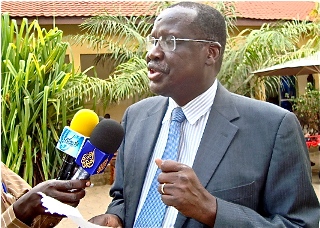South Sudan ex-minister slams dismissal of heads of parliamentary committees
December 20, 2015 (JUBA) – Former South Sudan’s minister of justice and constitutional affairs, John Luk Jok, has slammed decision of the speaker of the national parliament in which he dismissed heads of specialized parliamentary committees and their deputies from the leadership positions on the ground that they voted against a request seeking to give president Salva Kiir more constitutional powers to expand the constitutionally recognized 10 states to 28 states.

Jok, who led the transitional constitution making process when he was the minister and also member of the national legislative assembly, said he never learnt of powers given to the speaker to fire elected chairpersons in parliament.
“I have never seen when I was in parliament the power of the speaker to decree the dismissal of chairpersons of parliamentary standing committees because I thought they were elected unless you changed the law when we were away,” Jok wondered.
“But I don’t think there was that kind of provision. What was done was indirect election where caucuses sit and they come out with the names and then finally they are blessed by the speaker. This is what I know,” he added.
The former minister who is currently spokesman of the 10-person group known as the ‘former detainees’, made the remarks on Wednesday at a public lecture which brought together political actors to present their views on how the conflict could be resolved and move the country forward.
The public debate was organized by the Ebony Centre for Strategic Studies and brought representatives from the former political detainees, leader of the national alliance of 18 South Sudanese political parties, representative of the political parties allied to the government and a representative of the government.
A member of parliament in the national legislative assembly from Northern Bahr el Ghazal who voted in support of the creation of 28 states claimed in an interview with Sudan Tribune on Sunday that majority of the members did not have a choice because the members were directed by the chief whip to approve the presidential establishment order without objection.
“It would be stupid to show your view because it won’t change anything. The briefing we received at the SPLM caucus clearly indicated the presidential establishment was going to be forcefully approved, whether there were genuine views or not. So it was not a surprising that some of our colleagues were removed from their positions,” he said.
“I knew it was going to be a business as usual because it is a practice that the president gets what he wants whenever he calls for the change of the constitution. He has never been opposed,” he added.
The lawmaker said it would have been a waste time and unnecessary inconveniences from security operatives if one had refused to approve what they wanted.
The move to amend the constitution in favour of creating more states by the president was opposed as unconstitutional and a violation of the peace agreement signed in August between warring parties led by president Kiir and the armed opposition leader, Riek Machar.
Opposition political parties in the country, former detainees, opposition faction of the Sudan People’s Liberation Movement (SPLM-IO), regional and international players in the peace process all condemned the order as a violation.
However, the government went ahead by approving the order at the executive and legislative organs levels, paving the way for president Kiir to create whatever number of states he sees fit.
The parties to the agreement will however again work on the amendment of the same constitution, making the situation uncertain whether or not the recent unilateral constitutional amendments by the government will be reversed.
(ST)
